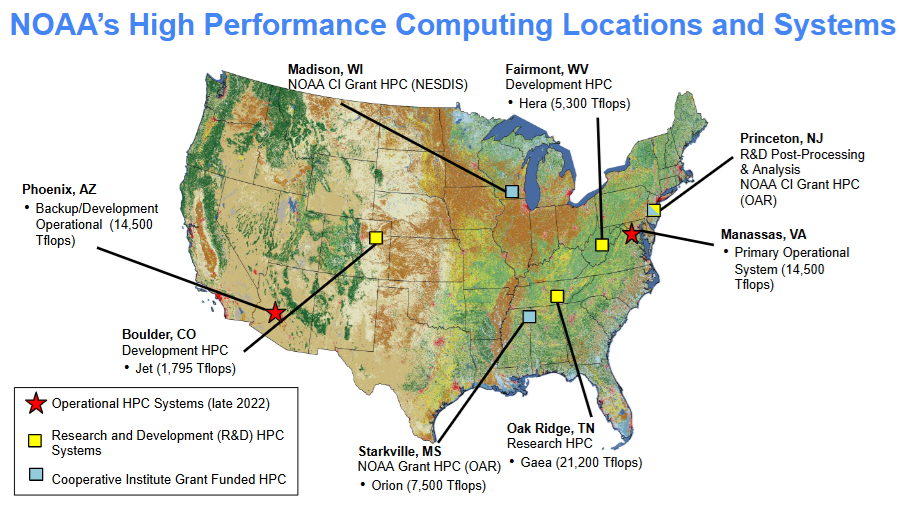
To improve the accuracy and timeliness of predictions, there is an ever-increasing volume of complex data and equations that need to be processed. NOAA currently operates four Research and Development High Performance Computing Systems (RDHPCS).
Internal Research & Development HPC Systems- Managed by NOAA (requires NOAA email ID to access) |
|
JET - Located at David Scaggs Research Center (DSRC) in Boulder, Colorado. JET is primarily used for hurricane research. |
|
HERA - Located at NOAA Environmental Security Computing Center (NESCC) in Fairmont, West Virginia. HERA replaced Theia in the Summer 2019. HERA is now extensively used for weather research and development. |
|
GAEA - Located at Oak Ridge National Laboratory (ORNL) in Oak Ridge, Tennessee. GAEA is primarily used for long-term climate and weather predictions and projections. |
|
Cloud HPC - NOAA RDHPCS Cloud Platform permits NOAA users to access computing resources beyond on premises systems, to create HPC clusters on an as-needed basis using Parallel Works platform. |
External Research & Development HPC System- Managed by Mississippi State University (does not require NOAA email ID to access) |
|
ORION - Located in Mississippi State University (MSU) in Starkville, Mississippi. Orion is funded via a grant from NOAA. It provides increased resources for scientific research and greater opportunities for collaboration with the academic community. |
Operational HPC System |
|
WCOSS - Located in Reston, Virginia, and Orlando, Florida. NOAA's Weather and Climate Operational Supercomputing System is known as WCOSS. WCOSS stores all of the forecast data generated by the operational supercomputers of NOAA's National Weather Service. WCOSS is managed by the National Center for Environmental Prediction (NCEP) Central Operations. |
Other R&D HPC System Resources |
|
Niagara - Located at NESCC in Fairmont, WV. It is primarily used for collaboration of R&D data with NOAA's researchers around the globe. |
|
PPAN - Located in the Geophysical Fluid Dynamics Laboratory (GFDL) in Princeton, New Jersey. The Post-Processing and Analysis (PPAN) system supports GFDL’s science community by providing a place to further analyze and interpret models generated on HPC systems. |
